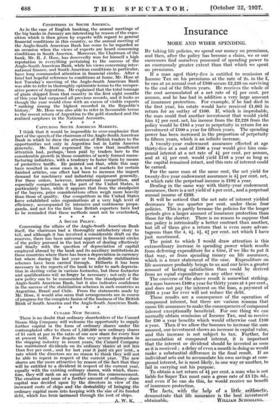Insurance
MORE AND WISER SPENDING.
BY taking life policies, we spend our money on premiums, and then, after the policy has become a claim, we or our successors find ourselves possessed of spending power to an enormously greater extent than that which we spent on premiums.
If a man aged thirty-five is entitled to remission of Income Tax on his premiums at the rate of 2s. in the 1, he can at an annual cost of £100 secure £2,228 on surviving- to the end of the fifteen years. He receives the whole of the cost accumulated at a net rate of 41 per cent, per annum, and he has had in addition a very large amount of insurance protection. For example, if he had died in the first year, his estate would have received £1,665 in return for an outlay of £100. If, which is improbable, the man could find another investment that would yield him 41 per cent. net, his income from the £2,228 from the policy would be £105 a year in perpetuity in return for an investment of £100 a year for fifteen years. The spending power has been increased in, the proportion of perpetuity to fifteen years, which is an infinite increase.
A twenty-year endowment assurance effected at age thirty-five at a cost of £100 a year would give him com- pound interest at a net rate of 41- per cent, per annum, and at 41-' per cent. would Yield £148 a year as long as the capital remained intact, and this rate of interest could be earned.
For the same man at the same cost, the net yield for twenty-five year endowment assurance is '41 per cent, net, at which rate the perpetual income is £192 a year.
Dealing in the same way with thirty-year endowment assurance, there is a net yield of 4 per cent., and a perpetual annual income of £233.
It will be noticed that the net rate of interest yielded decreases by one quarter per cent. under these four policies. This is partly because the policies for the longer periods give a larger amount of insurance protection than those for the shorter. There is no reason to suppose that one policy is intrinsically a better contract than another, but all of them give a return that is even more advan- tageous than the 4, 4; 4, 41 per cent. net which I have just mentioned. The Point to which -I would draw attention is this extraordinary increase in spending power which results from deferring expenditure' for a time, 'if we like to put it that way, or from spending Money on life assurance, which is a truer statement of the case. Expenditure on life assurance probably brings to us and our heirs a greater amount of lasting satisfaction than could be , derived from an equal expenditure in any other..Wayi , The converse of the above result is somewhat striking. If a man borrows £100 a year for thirty years at 4 per cent., and does not .pay the interest ,on the loan, a, payment of 2233 a year for ever will not reduce the debt.
These results are a consequence of the operation of compound interest, but there are various reasons that cause life assurance to make the consequences of compound interest" exceptionally beneficial. For one thing We can normally obtain remission of Income Tax, and so receive for £90 a year benefits which would otherwise cost £100 a year. Then if We allow:the bonuses to increase the sum assured, our investment shows an increase in capital value, and this increase is not subject to tax. Further, for accumulation at compound interest, it is important that the interest or dividend should be invested as soon as it is received ; a delay of even-a month- in doing so would make a substantial difference, in the final result. If an individual sets out to accumulate his own savings at com- pound interest, he is most likely, in one way or another, to fail in carrying but his purpose. To obtain a net return of 41 per cent. a man who is not liable for Super Tax must earn a gross rate of £5 12s. 6d., and even if he can do- this, he would receive no benefit of insurance protection. " ' The facts, with the help of a little arithmetic, demonstrate that life 'assurance is the best' investment


























































 Previous page
Previous page